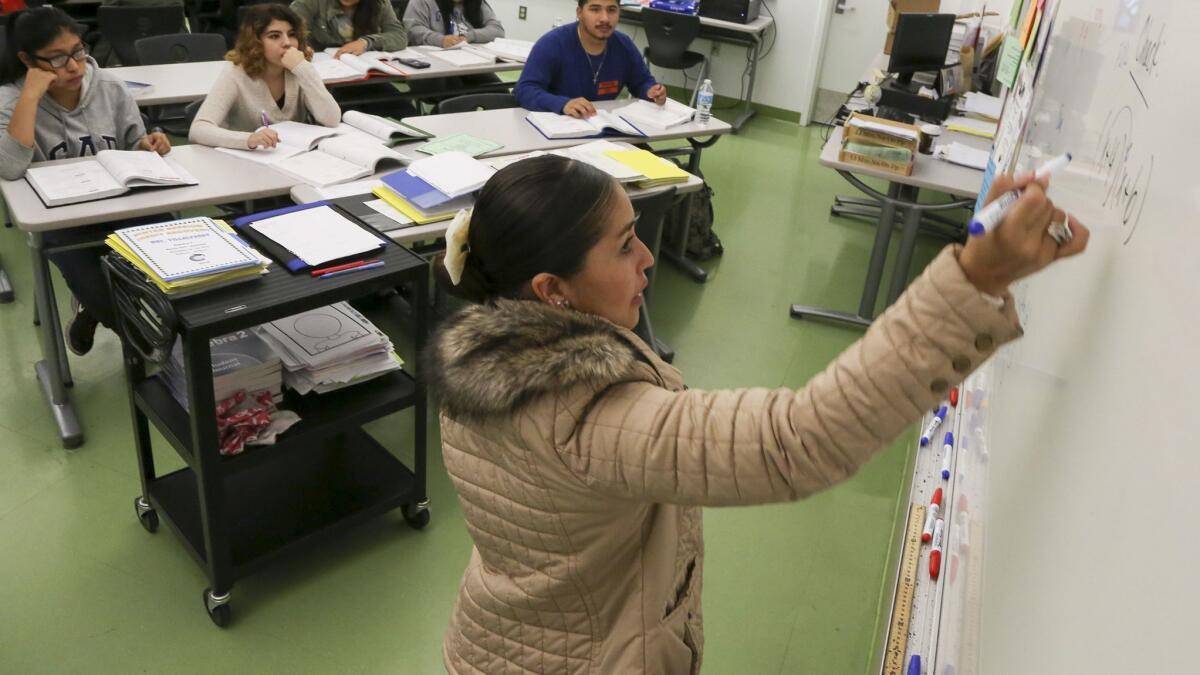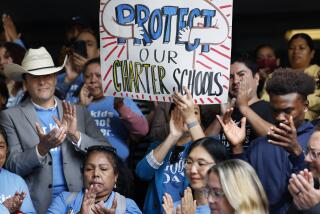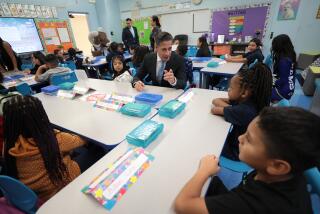An L.A. school task force calls for more accountability — starting with school report cards

Officials at Los Angeles Unified will tell you that the nation’s second-largest school system is doing well or at least has shown strong signs of improvement. Others are not so sure.
A task force examining the district wants a clear way to find out and has two suggestions: school report cards and a new commission aimed at making such assessments.
The L.A. Unified Advisory Task Force already has weighed in on what to do about students who miss a lot of classes and how to manage the school system’s real estate holdings.
Its latest report, released Thursday, says that the district compiles a great deal of information that could be useful to parents, the community and public officials, but “unfortunately, most of it is buried in obscure filings and byzantine forms that are inaccessible to the average person.”
Austin Beutner, the panel’s co-chair and a former L.A. Times publisher, said the report did not imply that officials were trying to hide things or failing to comply with disclosure requirements.
“But there is a big gap between compliance and that extra step you take to make sure that information is received and understood,” he said.
Interim L.A. schools Supt. Vivian Ekchian insists that L.A. Unified already is headed in the right direction. Future plans, which have been approved, include a smartphone app for parents, a simplified enrollment system and an open data portal that is meant to make a lot of information publicly available.
“We want to be the most transparent organization in the state as it relates to student learning, student outcomes and the safety of our students,” Ekchian said.
School report cards are not new. L.A. Unified produced them as recently as two years ago, when they fell victim to staff reductions after budget cuts. Ekchian agreed that relevant data about campuses should be more easily available.
Most other large schools systems have something along the lines of school report cards, but they’re not always considered meaningful successes. Giving schools simple letter grades, for example, can be misleading and may say more about students’ economic circumstances or the formulas used for the grading than they do about how good or bad an individual campus is.
California has a complex “dashboard” with multiple color-coded ratings for each school that critics have characterized as both overly complicated and not sufficiently revealing.
At Tuesday’s meeting, three school board members — Kelly Gonez, Nick Melvoin and George McKenna — will introduce a resolution calling for senior administrators to develop a “school performance framework that is holistic, reliable, accurate and consistent across all school models.” One outcome is supposed to be a rating for each school.
Board members would vote on the resolution at a later meeting.
The task force’s newer idea is a commission with seven members, each appointed by a member of the school board. The report suggests that appointees serve three-year terms for up to six years.
The envisioned commission would employ a small professional staff and be given unfettered access to district data. It could be funded, the report suggests, with money that currently goes to something called an independent analysis unit, which the district describes as the school board’s independent research arm.
The unit — which was revived last year after being cut from the budget nearly a decade ago — has posted reports online about topics including the current and future costs of employee health benefits, improving student outcomes in the middle grades, and early evidence of the positive effects of letting younger students into kindergarten.
Board member Gonez said she appreciated the task force, but also described the work of the existing research unit as “substantive and helpful.”
Beutner said the current unit may be worth preserving but that it is no substitute for an outside group, which would be less subject to bureaucratic and political interference.
The report cites the Congressional Budget Office, the California Legislative Analyst and New York City’s Independent Budget Office as models.
One issue an independent group could tackle, Beutner said, is a review of the district’s credit recovery options, which give students ways to get credit for courses they initially failed. Credit recovery has contributed to record graduation rates, but some question whether passing grades are being handed out too easily.
Board members have never asked for such a review, which could undermine the graduation success story.
Board member Melvoin said the recommendations were along lines that make sense for the district.
“Transparency is both an end in itself and the means to a higher-performing district and higher-performing schools,” he said. “It is the first step in building trust with the public.”
UPDATES:
2:40 pm: This article was updated to include a description of an expected school board resolution on creating a rating system for L.A. schools.
This article was originally published at 5 a.m.
More to Read
Start your day right
Sign up for Essential California for news, features and recommendations from the L.A. Times and beyond in your inbox six days a week.
You may occasionally receive promotional content from the Los Angeles Times.







